The Best 10 Alternatives to Google Cloud DNS (+ Pricing & Reviews)
Twingate Team
•
Jul 27, 2024

Google Cloud DNS is a scalable, reliable, and low-latency DNS service that leverages Google's global network to manage and serve domain names. While it offers robust features, it may not be the best fit for everyone. This article explores the benefits and considerations of using Google Cloud DNS.
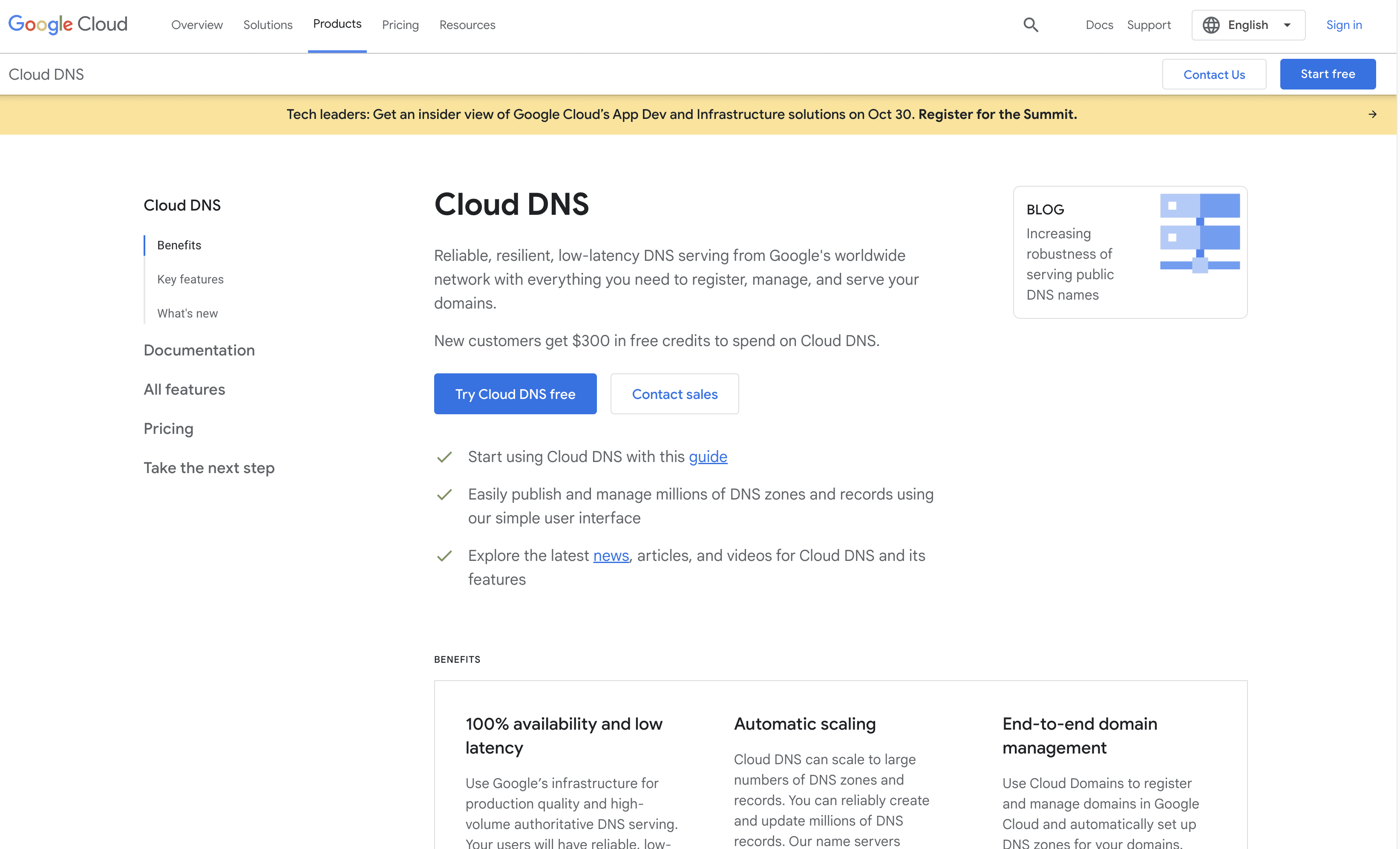
10 Alternatives to Google Cloud DNS
1. Twingate
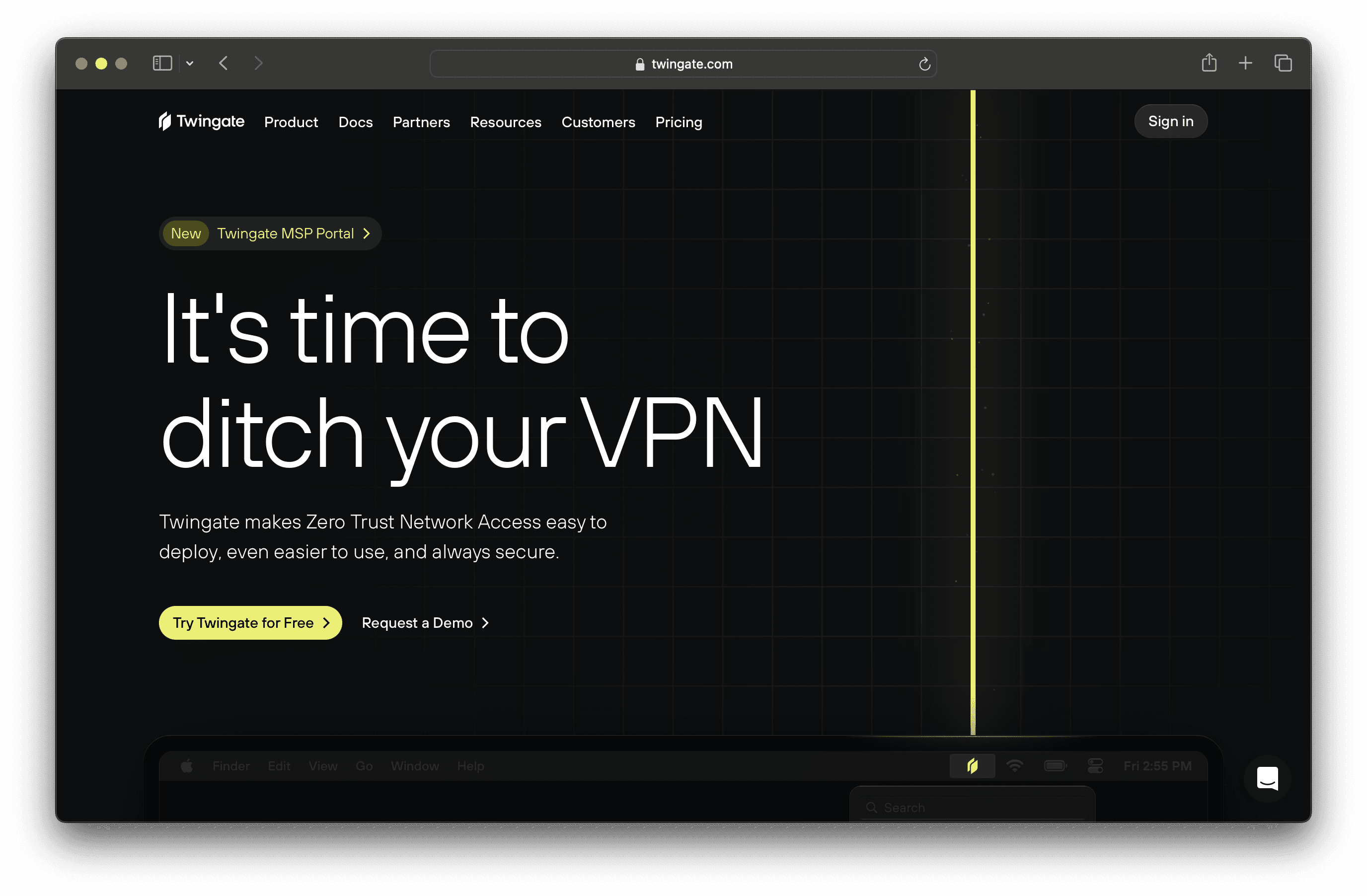
Twingate is a network security solution designed to replace traditional VPNs for remote access, offering a zero-trust security model and seamless deployment alongside existing infrastructure. With a focus on ease of use and scalability, Twingate aims to provide a secure and maintainable solution for businesses of all sizes.
Twingate Pricing
Starter: Free
Teams: $6 per user/month
Business: $12 per user/month
Enterprise: Custom pricing
Twingate Reviews
Twingate has an overall rating of 4.7 out of 5 stars based on 63 reviews. Users praise its ease of setup, security, and performance. Check out more of our reviews here!
Pros and Cons of Twingate
Pros:
Users appreciate Twingate's ease of use, making it accessible even for those not well-versed in data security software.
Setup is straightforward and quick, allowing businesses to deploy the solution without extensive technical expertise.
Performance efficiency is frequently highlighted, ensuring smooth and reliable access to private resources.
Cons:
Some users report performance issues, which can affect the overall reliability of the service.
Limited customization options may not meet the specific needs of all businesses.
Logging issues have been noted, potentially complicating the monitoring and auditing processes.
2. Cisco Umbrella
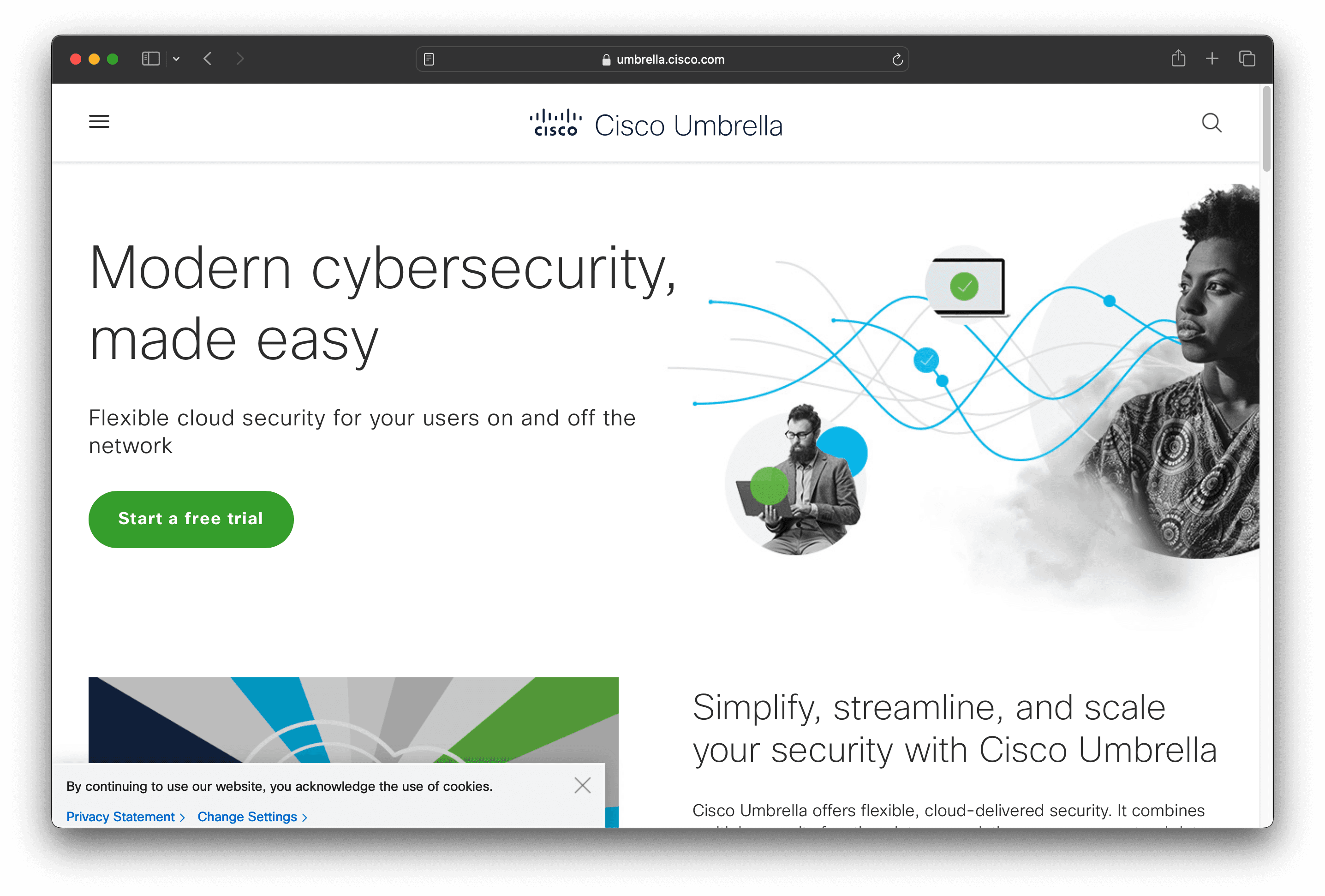
Cisco Umbrella is a cloud-delivered security service that provides DNS-layer protection, secure web gateway, and cloud access security broker capabilities. It aims to enhance security for businesses by blocking threats before they reach the network, ensuring a safer and more efficient online experience for users.
Cisco Umbrella Pricing
DNS Security Essentials Package
DNS Security Advantage Package
SIG Essentials Package
SIG Advantage Package
Umbrella Support Packages
Cisco Umbrella for Government Packages
Cisco Umbrella's pricing is not public. Contact their support for more info.
Cisco Umbrella Reviews
Cisco Umbrella has an overall rating of 4.4 out of 5 stars based on 271 reviews. Users appreciate its robust security and ease of use. Check out more of our reviews here!
Pros and Cons ofCisco Umbrella
Pros:
Users appreciate Cisco Umbrella's ease of use, making it accessible even for those not well-versed in data security software.
Provides robust, multi-layered security against a wide range of cyber threats, ensuring comprehensive protection.
Integrates seamlessly with other products and systems, enhancing overall network security and efficiency.
Cons:
Can be costly, particularly for small to medium-sized businesses, making it less accessible for some.
The user roles feature isn't very good and can be difficult to manage, complicating administrative tasks.
The web console can be slow to display monitored and gathered data for reporting, affecting user experience.
3. WebTitan Web Security
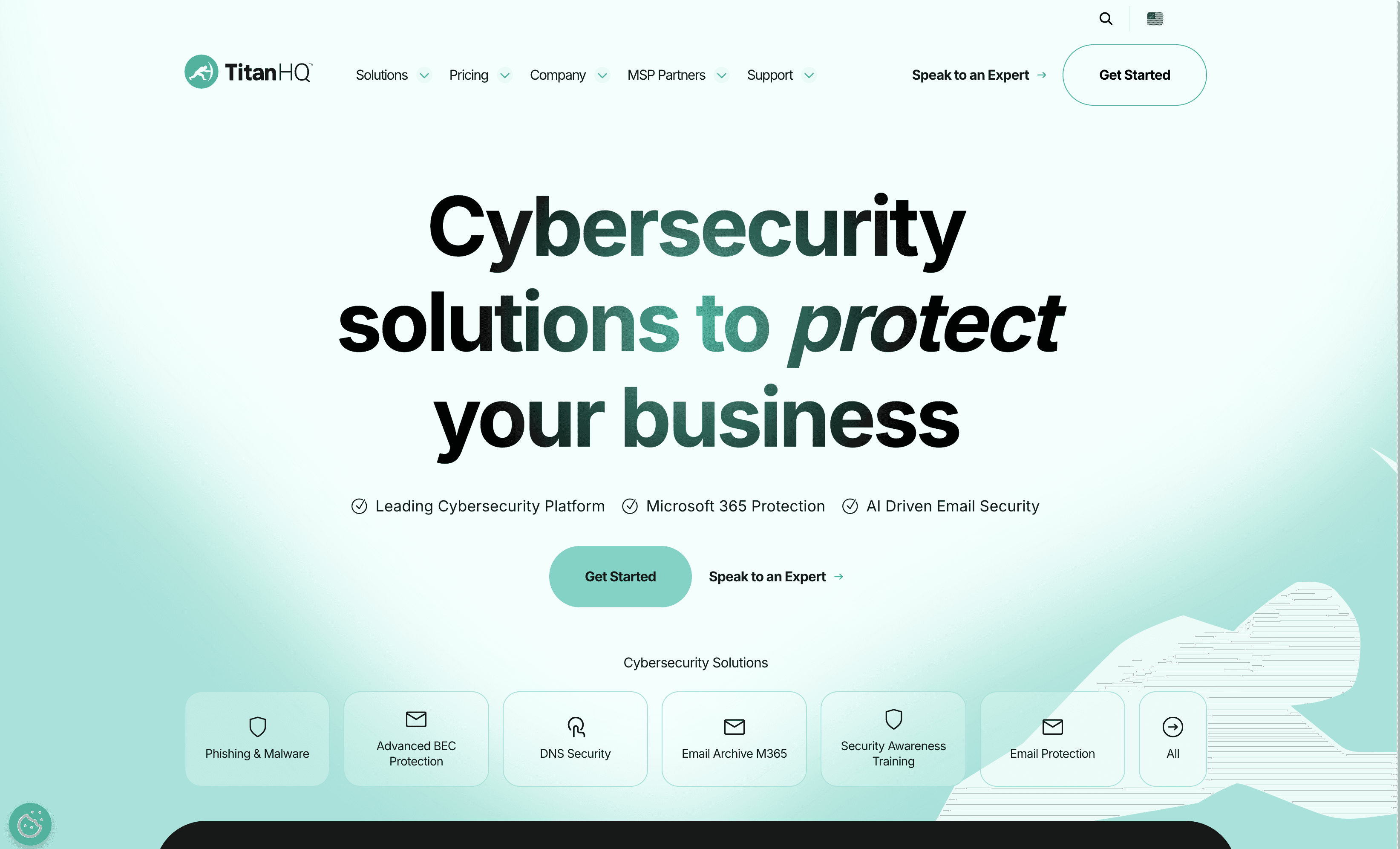
WebTitan is a web security solution designed to provide advanced DNS filtering and web content control. It aims to protect businesses from cyber threats by blocking malicious websites and managing internet usage. With a focus on ease of use and scalability, WebTitan offers a secure and efficient solution for organizations of all sizes.
WebTitan Web Security Pricing
Standard
Plus
Pro
WebTitan Web Security's pricing is not public. Contact their support for more info.
WebTitan Web Security Reviews
WebTitan Web Security has an overall rating of 4.3 out of 5 stars based on 85 reviews. Users appreciate its ease of setup and effective content filtering. Check out more of our reviews here!
Pros and Cons of WebTitan Web Security
Pros:
Advanced threat protection using AI, blocking malware, ransomware, and phishing sites in real-time.
Quick and easy installation, delivering immediate results without extensive setup.
Cloud-based solution, offering protection on-the-go without hardware or software management.
Cons:
Occasional false positives, mistakenly blocking legitimate websites.
Storage issues if the appliance isn't restarted periodically, affecting web interface access.
Limited device support, particularly for smartphones and Linux devices.
4. CloudFloorDNS
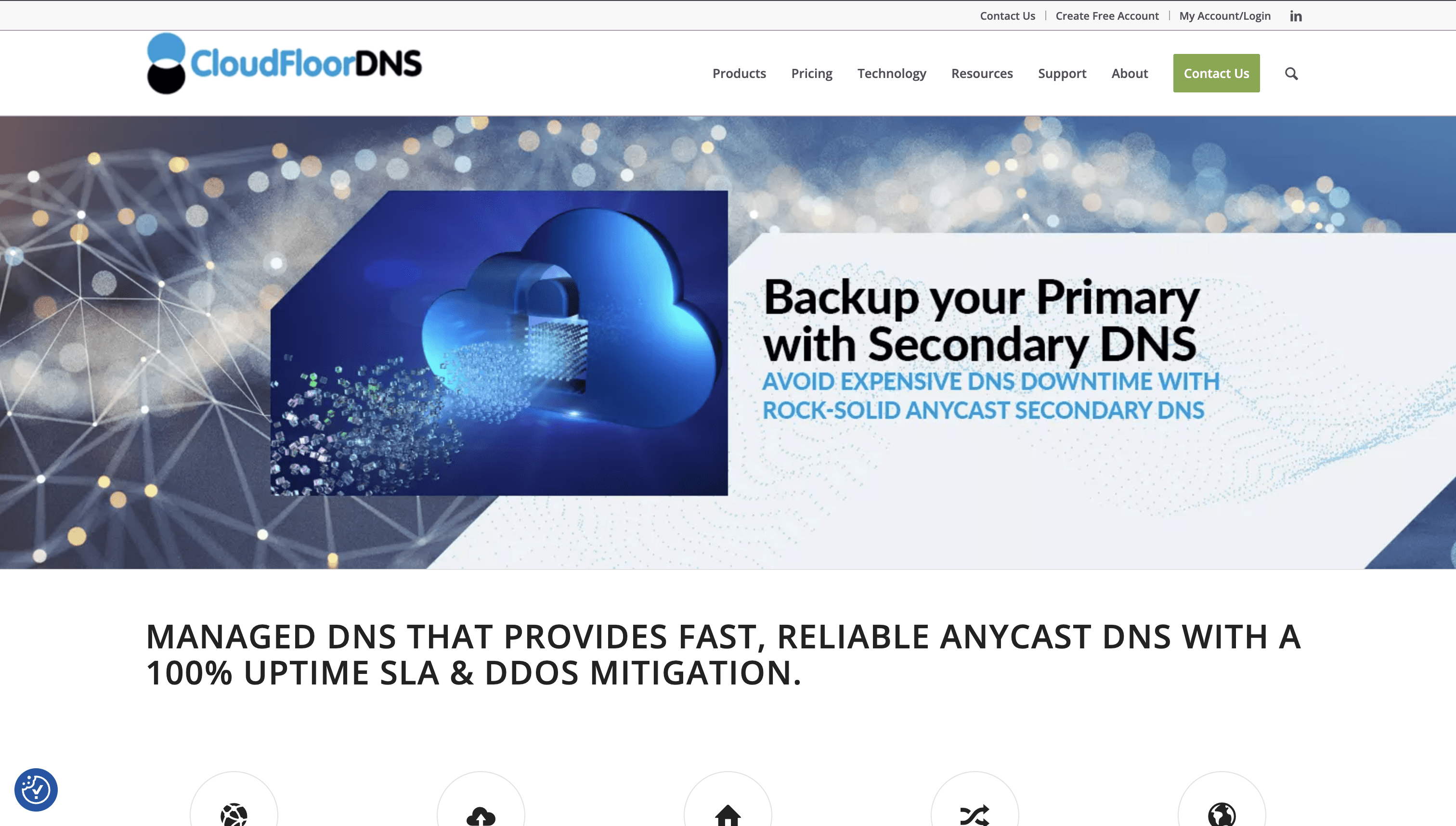
CloudfloorDNS is a DNS management solution offering services like Managed DNS, Secondary DNS, DNS Failover, and GEO DNS. With a focus on reliability and security, CloudfloorDNS ensures 100% uptime and DDoS mitigation. It provides a user-friendly interface and extensive API capabilities, making it suitable for businesses of all sizes.
CloudFloorDNS Pricing
DNS Failover: $50/month
CloudFloorDNS Reviews
CloudFloorDNS has an overall rating of 4.4 out of 5 stars based on 13 reviews. Users praise its security, flexibility, and speed. Check out more of our reviews here!
Pros and Cons of CloudFloorDNS
Pros:
100% uptime SLA ensures uninterrupted DNS service, providing reliability and peace of mind for businesses.
Lightning-fast Anycast network with 15+ POPs across four continents, ensuring quick and reliable DNS resolution.
Comprehensive DNS solutions, including Managed DNS, Secondary DNS, DNS Failover, and GEO DNS, cater to diverse needs.
Cons:
Costly DNS Failover services starting at $50/month, potentially prohibitive for small businesses or individual users.
Complexity of features and services may overwhelm users unfamiliar with DNS management, requiring a learning curve.
Occasional network connectivity issues reported, affecting the overall reliability and user experience.
5. Avast Secure Web Gateway
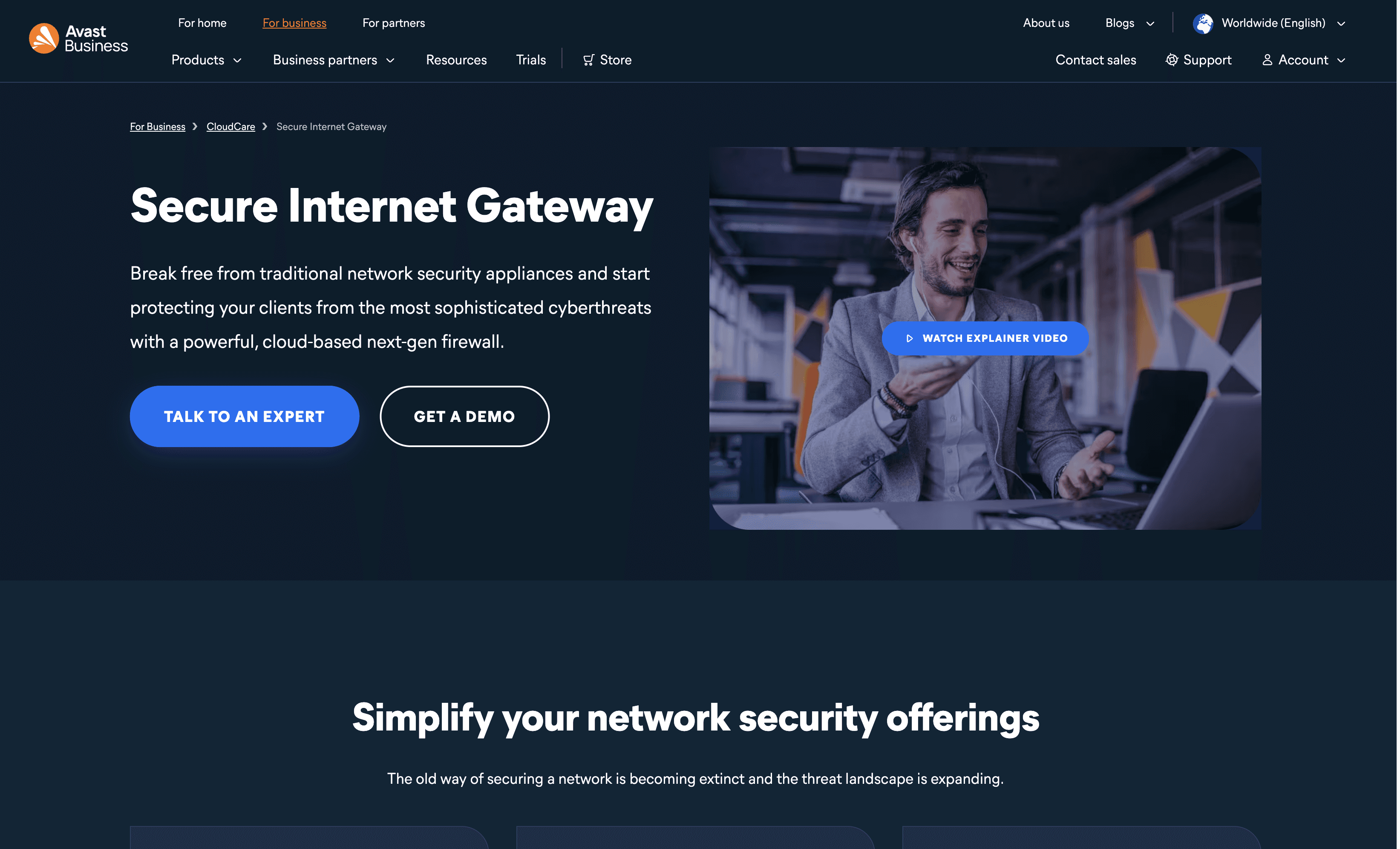
Avast Secure Web Gateway is a cloud-based network security solution designed to provide comprehensive protection for businesses. It offers features like SSL/TLS inspection, content filtering, and firewall protection. With easy deployment and seamless integration, Avast aims to enhance security while maintaining business efficiency.
Avast Secure Web Gateway Pricing
SIG
Advanced
Total
Avast Secure Web Gateway's pricing is not public. Contact their support for more info.
Avast Secure Web Gateway Reviews
Avast Secure Web Gateway has an overall rating of 5.0 out of 5 stars based on 2 reviews. Users praise its exceptional security and ease of use. Check out more of our reviews here!
Pros and Cons of Avast Secure Web Gateway
Pros:
Exceptional security blocks phishing and malware threats, providing an additional layer of protection.
Real-time URL scanning offers peace of mind when clicking on unknown links.
Intuitive interface is easy to use and navigate, even for non-experts.
Cons:
Occasional false positives flag legitimate websites or content as malicious, causing inconvenience.
Performance issues can slow down the system excessively after blocking some threats.
Dependence on stable internet connectivity; disruptions can impact security operations.
6. Gcore DNS
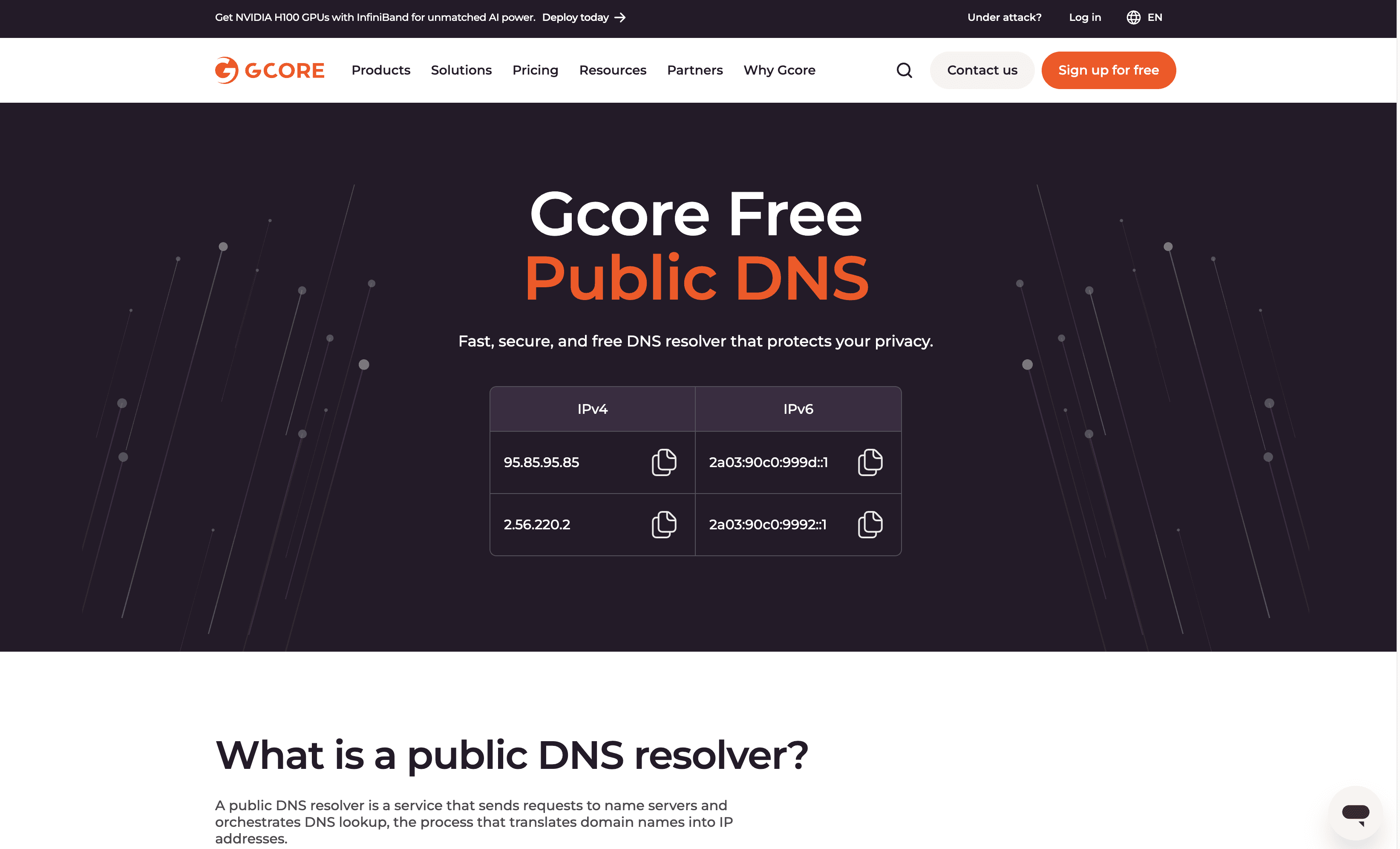
Gcore DNS is a public DNS service designed to offer fast, secure, and private DNS resolution. With a focus on speed and privacy, Gcore aims to provide a reliable and efficient DNS solution for users worldwide, ensuring enhanced online security and performance.
Gcore DNS Pricing
Gcore DNS's pricing is not public. Contact their support for more info.
Gcore DNS Reviews
Gcore DNS has an overall rating of 4.3 out of 5 stars based on 13 reviews. Users appreciate the customer support, DNS management, and pricing. Check out more of our reviews here!
Pros and Cons of Gcore DNS
Pros:
Fast response times, especially in Europe, South America, and Africa, ensuring quick DNS resolution for users in these regions.
Operates over a global edge network with 180+ PoPs worldwide, providing extensive coverage and reliability.
High level of privacy with anonymized query logs stored in a Luxembourg Tier IV data center under EU law.
Cons:
Performance is slower compared to Cloudflare's 1.1.1.1, which may affect users seeking the fastest DNS resolution.
Some users report DNS reliability issues, impacting the overall user experience and trust in the service.
Limited features compared to competitors, potentially making it less appealing for businesses with advanced needs.
7. Loopia DNS
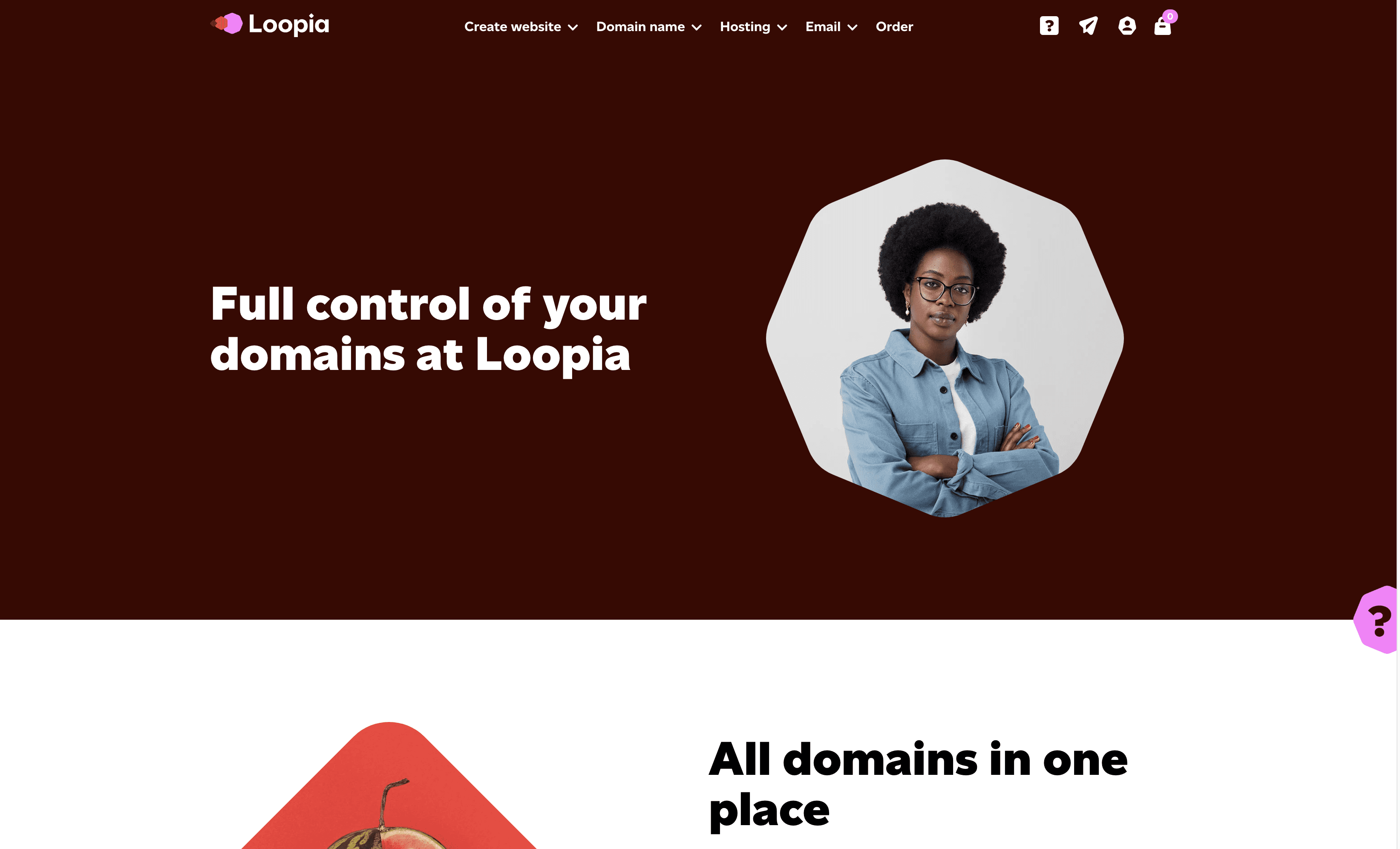
LoopiaDNS is a domain management solution designed to simplify DNS settings and email forwarding. It offers advanced DNS configurations, dynamic DNS, and DNS backup, making it a versatile tool for businesses of all sizes. With a user-friendly interface, LoopiaDNS ensures efficient and reliable domain management.
Loopia DNS Pricing
LoopiaDNS: 9 SEK per month excluding VAT
LoopiaDNS: 11.25 SEK per month including VAT
Loopia DNS Reviews
Loopia DNS has an overall rating of 4.1 out of 5 stars based on 12 reviews. Users appreciate its ease of use and efficient domain management. Check out more of our reviews here!
Pros and Cons of Loopia DNS
Pros:
Centralized management of all domain names, simplifying administration and reducing complexity.
Advanced DNS settings allow for detailed configurations, including www/email forwarding and dynamic DNS updates.
DNS backup feature ensures easy restoration of previous settings, providing peace of mind.
Cons:
Technical support can be slow, leading to prolonged resolution times for issues.
Server downtime at the start of the month due to billing load can disrupt services.
Navigation and help resources on the website are insufficient, complicating user experience.
8. F5 BIG-IP DNS
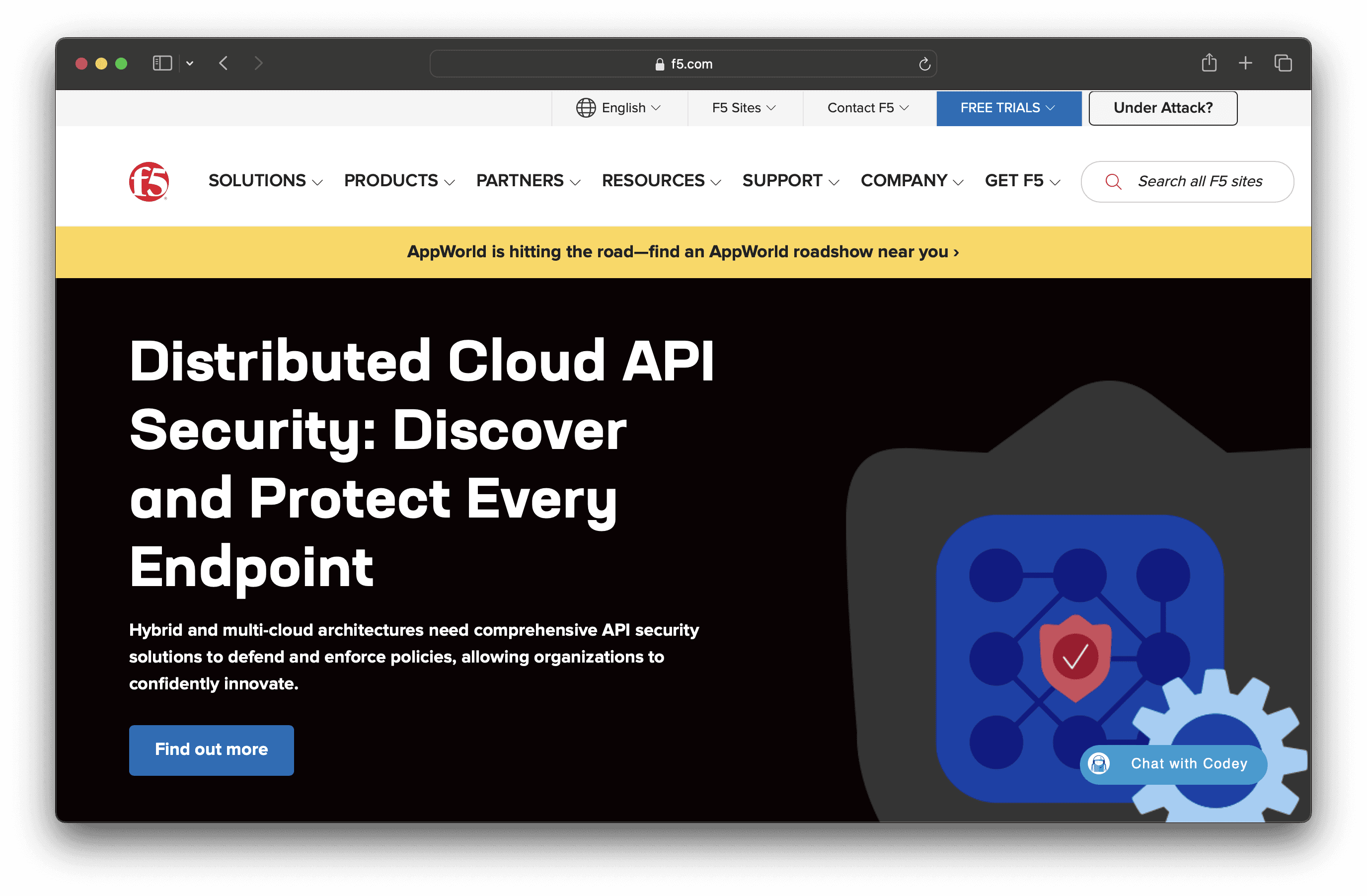
F5 BIG-IP DNS is designed to hyperscale and secure DNS infrastructure, ensuring high availability and performance of applications even during high query volumes and DDoS attacks. With features like DNS firewall, DNSSEC, and global server load balancing, it aims to optimize and protect DNS operations for businesses of all sizes.
F5 BIG-IP DNS Pricing
F5 BIG-IP DNS's pricing is not public. Contact their support for more info.
F5 BIG-IP DNS Reviews
F5 BIG-IP DNS has an overall rating of 4.2 out of 5 stars based on 11 reviews. Users appreciate its scalability and integration capabilities. Check out more of our reviews here!
Pros and Cons of F5 BIG-IP DNS
Pros:
High Performance: Capable of handling up to 100 million responses per second, ensuring optimal connectivity and user experience.
On-Demand Scaling: Allows for dynamic scaling of rate and object limits, adapting to varying traffic loads seamlessly.
Global Performance: Directs users to the fastest, most reliable connection based on location and server performance.
Cons:
Complexity: The system's comprehensive features may require specialized knowledge and training for effective management.
Cost: High-performance and secure DNS solutions like BIG-IP DNS can be expensive, potentially limiting accessibility for smaller organizations.
Connectivity Issues: Some users report occasional connectivity problems, impacting overall reliability and user trust.
9. ESET Parental Control
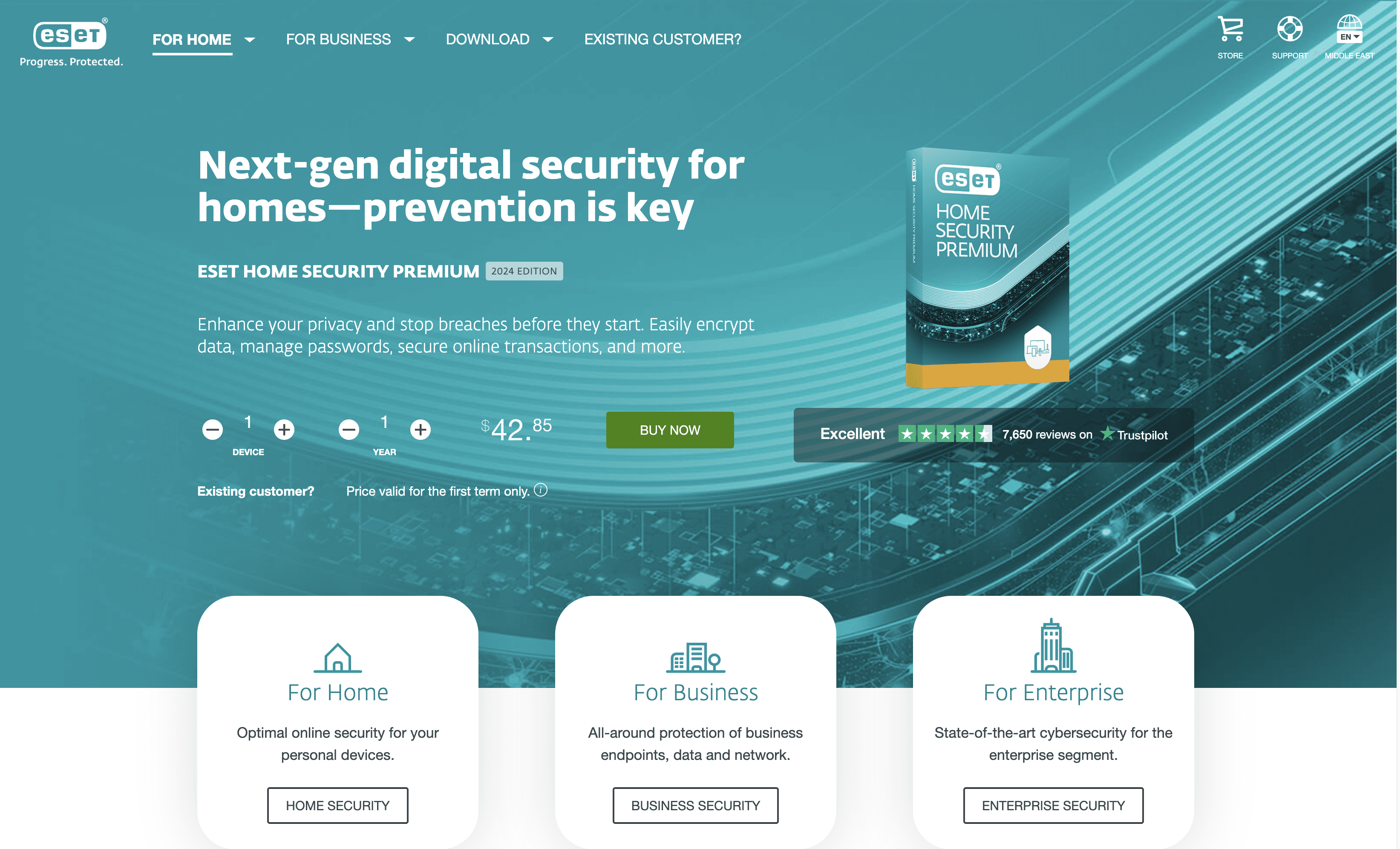
ESET Parental Control is a security solution designed to help parents manage and monitor their children's online activities. It offers features like app blocking, web filtering, and location tracking, ensuring a safe and controlled digital environment for kids. With an intuitive interface, it aims to provide peace of mind for families.
ESET Parental Control Pricing
Essential Plan: $29.95 per year for one device
Premium Plan: $44.95 per year for three devices
Ultimate Plan: $89.95 per year for five devices
ESET Parental Control Reviews
ESET Parental Control has an overall rating of 4.3 out of 5 stars based on 10 reviews. Users appreciate its ease of use and effective malware protection. Check out more of our reviews here!
Pros and Cons of ESET Parental Control
Pros:
Comprehensive Monitoring: ESET Parental Control offers detailed monitoring of children's online activities, ensuring a safe digital environment.
App Blocking: Allows parents to block inappropriate apps, providing an additional layer of security for children.
Location Tracking: Real-time location tracking helps parents keep tabs on their children's whereabouts, enhancing safety.
Cons:
Occasional False Positives: Sometimes blocks legitimate apps or websites, causing inconvenience and frustration.
Performance Issues: Can slow down devices, particularly when multiple features are active simultaneously.
Complex Setup: Initial setup can be complicated for users not familiar with security software, requiring a learning curve.
10. WebTitan
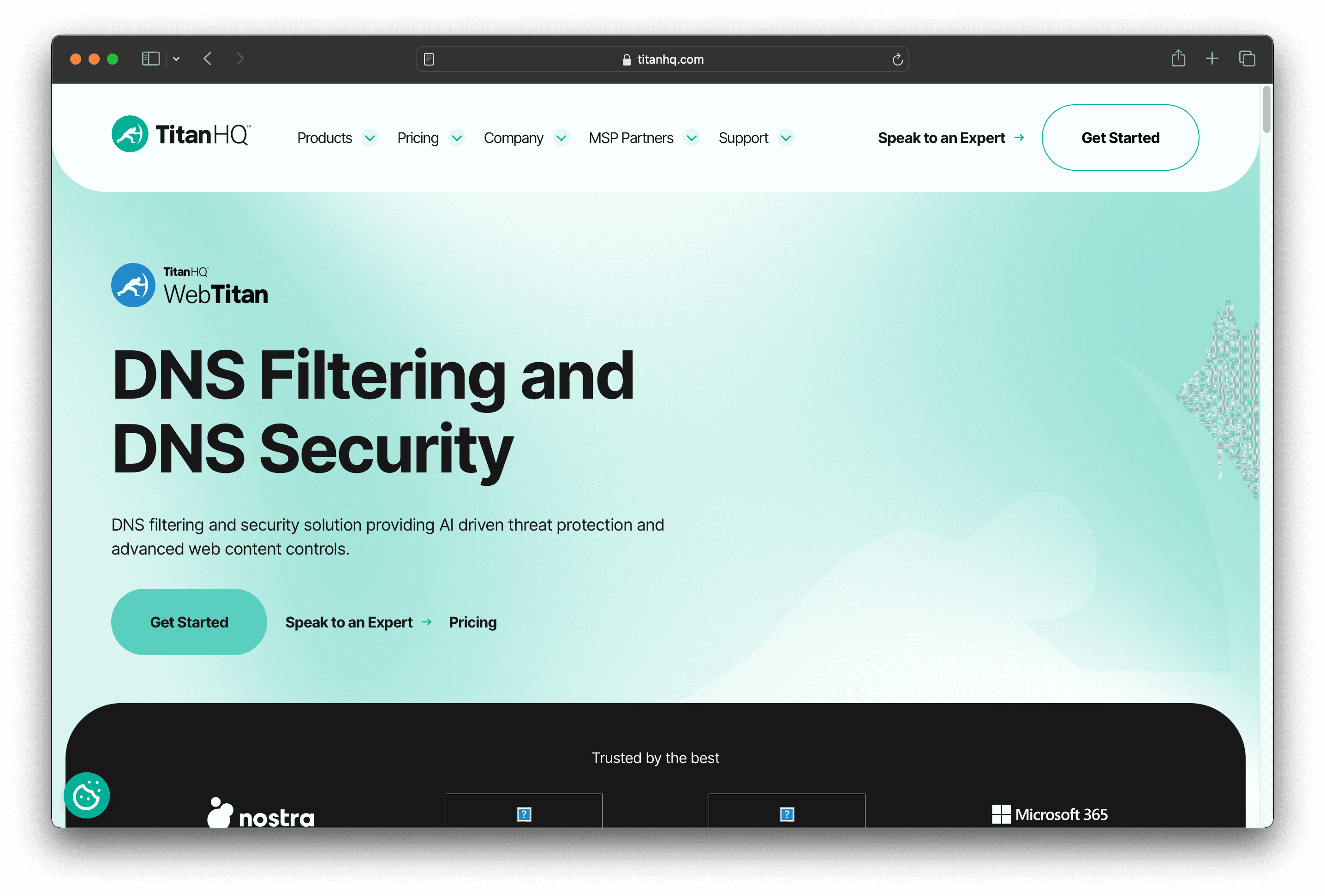
WebTitan is a web security solution offering advanced DNS filtering and web content control. It aims to protect businesses from cyber threats by blocking malicious websites and managing internet usage. With a focus on ease of use and scalability, WebTitan provides a secure and efficient solution for organizations of all sizes.
WebTitan Pricing
Standard
Plus
Pro
WebTitan's pricing is not public. Contact their support for more info.
WebTitan Reviews
WebTitan has an overall rating of 4.3 out of 5 stars based on 85 reviews. Users appreciate the ease of setup and effective content filtering. Check out more of our reviews here!
Pros and Cons of WebTitan
Pros:
Real-Time Threat Detection: Uses AI and machine learning to identify and block threats instantly, ensuring robust security.
Scalability: Handles any volume of usage without latency, making it suitable for businesses of all sizes.
Ease of Use: Simple setup and management, requiring minimal technical intervention, making it accessible for non-experts.
Cons:
False Positives: Occasionally blocks legitimate websites, causing inconvenience and requiring manual intervention.
Manual Restarts: The appliance may need manual restarts if storage becomes full, affecting continuous operation.
Limited Device Support: Does not fully support smartphones and Linux devices, limiting its usability across all platforms.
Looking to secure your technical infrastructure?
Twingate offers granular access controls and deployment automations to protect your VPC environment. By leveraging Zero Trust security tools, Twingate ensures that private resources and internet traffic remain secure in the modern work landscape. Try Twingate for Free today!
Rapidly implement a modern Zero Trust network that is more secure and maintainable than VPNs.
The Best 10 Alternatives to Google Cloud DNS (+ Pricing & Reviews)
Twingate Team
•
Jul 27, 2024

Google Cloud DNS is a scalable, reliable, and low-latency DNS service that leverages Google's global network to manage and serve domain names. While it offers robust features, it may not be the best fit for everyone. This article explores the benefits and considerations of using Google Cloud DNS.

10 Alternatives to Google Cloud DNS
1. Twingate

Twingate is a network security solution designed to replace traditional VPNs for remote access, offering a zero-trust security model and seamless deployment alongside existing infrastructure. With a focus on ease of use and scalability, Twingate aims to provide a secure and maintainable solution for businesses of all sizes.
Twingate Pricing
Starter: Free
Teams: $6 per user/month
Business: $12 per user/month
Enterprise: Custom pricing
Twingate Reviews
Twingate has an overall rating of 4.7 out of 5 stars based on 63 reviews. Users praise its ease of setup, security, and performance. Check out more of our reviews here!
Pros and Cons of Twingate
Pros:
Users appreciate Twingate's ease of use, making it accessible even for those not well-versed in data security software.
Setup is straightforward and quick, allowing businesses to deploy the solution without extensive technical expertise.
Performance efficiency is frequently highlighted, ensuring smooth and reliable access to private resources.
Cons:
Some users report performance issues, which can affect the overall reliability of the service.
Limited customization options may not meet the specific needs of all businesses.
Logging issues have been noted, potentially complicating the monitoring and auditing processes.
2. Cisco Umbrella

Cisco Umbrella is a cloud-delivered security service that provides DNS-layer protection, secure web gateway, and cloud access security broker capabilities. It aims to enhance security for businesses by blocking threats before they reach the network, ensuring a safer and more efficient online experience for users.
Cisco Umbrella Pricing
DNS Security Essentials Package
DNS Security Advantage Package
SIG Essentials Package
SIG Advantage Package
Umbrella Support Packages
Cisco Umbrella for Government Packages
Cisco Umbrella's pricing is not public. Contact their support for more info.
Cisco Umbrella Reviews
Cisco Umbrella has an overall rating of 4.4 out of 5 stars based on 271 reviews. Users appreciate its robust security and ease of use. Check out more of our reviews here!
Pros and Cons ofCisco Umbrella
Pros:
Users appreciate Cisco Umbrella's ease of use, making it accessible even for those not well-versed in data security software.
Provides robust, multi-layered security against a wide range of cyber threats, ensuring comprehensive protection.
Integrates seamlessly with other products and systems, enhancing overall network security and efficiency.
Cons:
Can be costly, particularly for small to medium-sized businesses, making it less accessible for some.
The user roles feature isn't very good and can be difficult to manage, complicating administrative tasks.
The web console can be slow to display monitored and gathered data for reporting, affecting user experience.
3. WebTitan Web Security

WebTitan is a web security solution designed to provide advanced DNS filtering and web content control. It aims to protect businesses from cyber threats by blocking malicious websites and managing internet usage. With a focus on ease of use and scalability, WebTitan offers a secure and efficient solution for organizations of all sizes.
WebTitan Web Security Pricing
Standard
Plus
Pro
WebTitan Web Security's pricing is not public. Contact their support for more info.
WebTitan Web Security Reviews
WebTitan Web Security has an overall rating of 4.3 out of 5 stars based on 85 reviews. Users appreciate its ease of setup and effective content filtering. Check out more of our reviews here!
Pros and Cons of WebTitan Web Security
Pros:
Advanced threat protection using AI, blocking malware, ransomware, and phishing sites in real-time.
Quick and easy installation, delivering immediate results without extensive setup.
Cloud-based solution, offering protection on-the-go without hardware or software management.
Cons:
Occasional false positives, mistakenly blocking legitimate websites.
Storage issues if the appliance isn't restarted periodically, affecting web interface access.
Limited device support, particularly for smartphones and Linux devices.
4. CloudFloorDNS

CloudfloorDNS is a DNS management solution offering services like Managed DNS, Secondary DNS, DNS Failover, and GEO DNS. With a focus on reliability and security, CloudfloorDNS ensures 100% uptime and DDoS mitigation. It provides a user-friendly interface and extensive API capabilities, making it suitable for businesses of all sizes.
CloudFloorDNS Pricing
DNS Failover: $50/month
CloudFloorDNS Reviews
CloudFloorDNS has an overall rating of 4.4 out of 5 stars based on 13 reviews. Users praise its security, flexibility, and speed. Check out more of our reviews here!
Pros and Cons of CloudFloorDNS
Pros:
100% uptime SLA ensures uninterrupted DNS service, providing reliability and peace of mind for businesses.
Lightning-fast Anycast network with 15+ POPs across four continents, ensuring quick and reliable DNS resolution.
Comprehensive DNS solutions, including Managed DNS, Secondary DNS, DNS Failover, and GEO DNS, cater to diverse needs.
Cons:
Costly DNS Failover services starting at $50/month, potentially prohibitive for small businesses or individual users.
Complexity of features and services may overwhelm users unfamiliar with DNS management, requiring a learning curve.
Occasional network connectivity issues reported, affecting the overall reliability and user experience.
5. Avast Secure Web Gateway

Avast Secure Web Gateway is a cloud-based network security solution designed to provide comprehensive protection for businesses. It offers features like SSL/TLS inspection, content filtering, and firewall protection. With easy deployment and seamless integration, Avast aims to enhance security while maintaining business efficiency.
Avast Secure Web Gateway Pricing
SIG
Advanced
Total
Avast Secure Web Gateway's pricing is not public. Contact their support for more info.
Avast Secure Web Gateway Reviews
Avast Secure Web Gateway has an overall rating of 5.0 out of 5 stars based on 2 reviews. Users praise its exceptional security and ease of use. Check out more of our reviews here!
Pros and Cons of Avast Secure Web Gateway
Pros:
Exceptional security blocks phishing and malware threats, providing an additional layer of protection.
Real-time URL scanning offers peace of mind when clicking on unknown links.
Intuitive interface is easy to use and navigate, even for non-experts.
Cons:
Occasional false positives flag legitimate websites or content as malicious, causing inconvenience.
Performance issues can slow down the system excessively after blocking some threats.
Dependence on stable internet connectivity; disruptions can impact security operations.
6. Gcore DNS

Gcore DNS is a public DNS service designed to offer fast, secure, and private DNS resolution. With a focus on speed and privacy, Gcore aims to provide a reliable and efficient DNS solution for users worldwide, ensuring enhanced online security and performance.
Gcore DNS Pricing
Gcore DNS's pricing is not public. Contact their support for more info.
Gcore DNS Reviews
Gcore DNS has an overall rating of 4.3 out of 5 stars based on 13 reviews. Users appreciate the customer support, DNS management, and pricing. Check out more of our reviews here!
Pros and Cons of Gcore DNS
Pros:
Fast response times, especially in Europe, South America, and Africa, ensuring quick DNS resolution for users in these regions.
Operates over a global edge network with 180+ PoPs worldwide, providing extensive coverage and reliability.
High level of privacy with anonymized query logs stored in a Luxembourg Tier IV data center under EU law.
Cons:
Performance is slower compared to Cloudflare's 1.1.1.1, which may affect users seeking the fastest DNS resolution.
Some users report DNS reliability issues, impacting the overall user experience and trust in the service.
Limited features compared to competitors, potentially making it less appealing for businesses with advanced needs.
7. Loopia DNS

LoopiaDNS is a domain management solution designed to simplify DNS settings and email forwarding. It offers advanced DNS configurations, dynamic DNS, and DNS backup, making it a versatile tool for businesses of all sizes. With a user-friendly interface, LoopiaDNS ensures efficient and reliable domain management.
Loopia DNS Pricing
LoopiaDNS: 9 SEK per month excluding VAT
LoopiaDNS: 11.25 SEK per month including VAT
Loopia DNS Reviews
Loopia DNS has an overall rating of 4.1 out of 5 stars based on 12 reviews. Users appreciate its ease of use and efficient domain management. Check out more of our reviews here!
Pros and Cons of Loopia DNS
Pros:
Centralized management of all domain names, simplifying administration and reducing complexity.
Advanced DNS settings allow for detailed configurations, including www/email forwarding and dynamic DNS updates.
DNS backup feature ensures easy restoration of previous settings, providing peace of mind.
Cons:
Technical support can be slow, leading to prolonged resolution times for issues.
Server downtime at the start of the month due to billing load can disrupt services.
Navigation and help resources on the website are insufficient, complicating user experience.
8. F5 BIG-IP DNS

F5 BIG-IP DNS is designed to hyperscale and secure DNS infrastructure, ensuring high availability and performance of applications even during high query volumes and DDoS attacks. With features like DNS firewall, DNSSEC, and global server load balancing, it aims to optimize and protect DNS operations for businesses of all sizes.
F5 BIG-IP DNS Pricing
F5 BIG-IP DNS's pricing is not public. Contact their support for more info.
F5 BIG-IP DNS Reviews
F5 BIG-IP DNS has an overall rating of 4.2 out of 5 stars based on 11 reviews. Users appreciate its scalability and integration capabilities. Check out more of our reviews here!
Pros and Cons of F5 BIG-IP DNS
Pros:
High Performance: Capable of handling up to 100 million responses per second, ensuring optimal connectivity and user experience.
On-Demand Scaling: Allows for dynamic scaling of rate and object limits, adapting to varying traffic loads seamlessly.
Global Performance: Directs users to the fastest, most reliable connection based on location and server performance.
Cons:
Complexity: The system's comprehensive features may require specialized knowledge and training for effective management.
Cost: High-performance and secure DNS solutions like BIG-IP DNS can be expensive, potentially limiting accessibility for smaller organizations.
Connectivity Issues: Some users report occasional connectivity problems, impacting overall reliability and user trust.
9. ESET Parental Control

ESET Parental Control is a security solution designed to help parents manage and monitor their children's online activities. It offers features like app blocking, web filtering, and location tracking, ensuring a safe and controlled digital environment for kids. With an intuitive interface, it aims to provide peace of mind for families.
ESET Parental Control Pricing
Essential Plan: $29.95 per year for one device
Premium Plan: $44.95 per year for three devices
Ultimate Plan: $89.95 per year for five devices
ESET Parental Control Reviews
ESET Parental Control has an overall rating of 4.3 out of 5 stars based on 10 reviews. Users appreciate its ease of use and effective malware protection. Check out more of our reviews here!
Pros and Cons of ESET Parental Control
Pros:
Comprehensive Monitoring: ESET Parental Control offers detailed monitoring of children's online activities, ensuring a safe digital environment.
App Blocking: Allows parents to block inappropriate apps, providing an additional layer of security for children.
Location Tracking: Real-time location tracking helps parents keep tabs on their children's whereabouts, enhancing safety.
Cons:
Occasional False Positives: Sometimes blocks legitimate apps or websites, causing inconvenience and frustration.
Performance Issues: Can slow down devices, particularly when multiple features are active simultaneously.
Complex Setup: Initial setup can be complicated for users not familiar with security software, requiring a learning curve.
10. WebTitan

WebTitan is a web security solution offering advanced DNS filtering and web content control. It aims to protect businesses from cyber threats by blocking malicious websites and managing internet usage. With a focus on ease of use and scalability, WebTitan provides a secure and efficient solution for organizations of all sizes.
WebTitan Pricing
Standard
Plus
Pro
WebTitan's pricing is not public. Contact their support for more info.
WebTitan Reviews
WebTitan has an overall rating of 4.3 out of 5 stars based on 85 reviews. Users appreciate the ease of setup and effective content filtering. Check out more of our reviews here!
Pros and Cons of WebTitan
Pros:
Real-Time Threat Detection: Uses AI and machine learning to identify and block threats instantly, ensuring robust security.
Scalability: Handles any volume of usage without latency, making it suitable for businesses of all sizes.
Ease of Use: Simple setup and management, requiring minimal technical intervention, making it accessible for non-experts.
Cons:
False Positives: Occasionally blocks legitimate websites, causing inconvenience and requiring manual intervention.
Manual Restarts: The appliance may need manual restarts if storage becomes full, affecting continuous operation.
Limited Device Support: Does not fully support smartphones and Linux devices, limiting its usability across all platforms.
Looking to secure your technical infrastructure?
Twingate offers granular access controls and deployment automations to protect your VPC environment. By leveraging Zero Trust security tools, Twingate ensures that private resources and internet traffic remain secure in the modern work landscape. Try Twingate for Free today!
Rapidly implement a modern Zero Trust network that is more secure and maintainable than VPNs.
The Best 10 Alternatives to Google Cloud DNS (+ Pricing & Reviews)
Twingate Team
•
Jul 27, 2024

Google Cloud DNS is a scalable, reliable, and low-latency DNS service that leverages Google's global network to manage and serve domain names. While it offers robust features, it may not be the best fit for everyone. This article explores the benefits and considerations of using Google Cloud DNS.

10 Alternatives to Google Cloud DNS
1. Twingate

Twingate is a network security solution designed to replace traditional VPNs for remote access, offering a zero-trust security model and seamless deployment alongside existing infrastructure. With a focus on ease of use and scalability, Twingate aims to provide a secure and maintainable solution for businesses of all sizes.
Twingate Pricing
Starter: Free
Teams: $6 per user/month
Business: $12 per user/month
Enterprise: Custom pricing
Twingate Reviews
Twingate has an overall rating of 4.7 out of 5 stars based on 63 reviews. Users praise its ease of setup, security, and performance. Check out more of our reviews here!
Pros and Cons of Twingate
Pros:
Users appreciate Twingate's ease of use, making it accessible even for those not well-versed in data security software.
Setup is straightforward and quick, allowing businesses to deploy the solution without extensive technical expertise.
Performance efficiency is frequently highlighted, ensuring smooth and reliable access to private resources.
Cons:
Some users report performance issues, which can affect the overall reliability of the service.
Limited customization options may not meet the specific needs of all businesses.
Logging issues have been noted, potentially complicating the monitoring and auditing processes.
2. Cisco Umbrella

Cisco Umbrella is a cloud-delivered security service that provides DNS-layer protection, secure web gateway, and cloud access security broker capabilities. It aims to enhance security for businesses by blocking threats before they reach the network, ensuring a safer and more efficient online experience for users.
Cisco Umbrella Pricing
DNS Security Essentials Package
DNS Security Advantage Package
SIG Essentials Package
SIG Advantage Package
Umbrella Support Packages
Cisco Umbrella for Government Packages
Cisco Umbrella's pricing is not public. Contact their support for more info.
Cisco Umbrella Reviews
Cisco Umbrella has an overall rating of 4.4 out of 5 stars based on 271 reviews. Users appreciate its robust security and ease of use. Check out more of our reviews here!
Pros and Cons ofCisco Umbrella
Pros:
Users appreciate Cisco Umbrella's ease of use, making it accessible even for those not well-versed in data security software.
Provides robust, multi-layered security against a wide range of cyber threats, ensuring comprehensive protection.
Integrates seamlessly with other products and systems, enhancing overall network security and efficiency.
Cons:
Can be costly, particularly for small to medium-sized businesses, making it less accessible for some.
The user roles feature isn't very good and can be difficult to manage, complicating administrative tasks.
The web console can be slow to display monitored and gathered data for reporting, affecting user experience.
3. WebTitan Web Security

WebTitan is a web security solution designed to provide advanced DNS filtering and web content control. It aims to protect businesses from cyber threats by blocking malicious websites and managing internet usage. With a focus on ease of use and scalability, WebTitan offers a secure and efficient solution for organizations of all sizes.
WebTitan Web Security Pricing
Standard
Plus
Pro
WebTitan Web Security's pricing is not public. Contact their support for more info.
WebTitan Web Security Reviews
WebTitan Web Security has an overall rating of 4.3 out of 5 stars based on 85 reviews. Users appreciate its ease of setup and effective content filtering. Check out more of our reviews here!
Pros and Cons of WebTitan Web Security
Pros:
Advanced threat protection using AI, blocking malware, ransomware, and phishing sites in real-time.
Quick and easy installation, delivering immediate results without extensive setup.
Cloud-based solution, offering protection on-the-go without hardware or software management.
Cons:
Occasional false positives, mistakenly blocking legitimate websites.
Storage issues if the appliance isn't restarted periodically, affecting web interface access.
Limited device support, particularly for smartphones and Linux devices.
4. CloudFloorDNS

CloudfloorDNS is a DNS management solution offering services like Managed DNS, Secondary DNS, DNS Failover, and GEO DNS. With a focus on reliability and security, CloudfloorDNS ensures 100% uptime and DDoS mitigation. It provides a user-friendly interface and extensive API capabilities, making it suitable for businesses of all sizes.
CloudFloorDNS Pricing
DNS Failover: $50/month
CloudFloorDNS Reviews
CloudFloorDNS has an overall rating of 4.4 out of 5 stars based on 13 reviews. Users praise its security, flexibility, and speed. Check out more of our reviews here!
Pros and Cons of CloudFloorDNS
Pros:
100% uptime SLA ensures uninterrupted DNS service, providing reliability and peace of mind for businesses.
Lightning-fast Anycast network with 15+ POPs across four continents, ensuring quick and reliable DNS resolution.
Comprehensive DNS solutions, including Managed DNS, Secondary DNS, DNS Failover, and GEO DNS, cater to diverse needs.
Cons:
Costly DNS Failover services starting at $50/month, potentially prohibitive for small businesses or individual users.
Complexity of features and services may overwhelm users unfamiliar with DNS management, requiring a learning curve.
Occasional network connectivity issues reported, affecting the overall reliability and user experience.
5. Avast Secure Web Gateway

Avast Secure Web Gateway is a cloud-based network security solution designed to provide comprehensive protection for businesses. It offers features like SSL/TLS inspection, content filtering, and firewall protection. With easy deployment and seamless integration, Avast aims to enhance security while maintaining business efficiency.
Avast Secure Web Gateway Pricing
SIG
Advanced
Total
Avast Secure Web Gateway's pricing is not public. Contact their support for more info.
Avast Secure Web Gateway Reviews
Avast Secure Web Gateway has an overall rating of 5.0 out of 5 stars based on 2 reviews. Users praise its exceptional security and ease of use. Check out more of our reviews here!
Pros and Cons of Avast Secure Web Gateway
Pros:
Exceptional security blocks phishing and malware threats, providing an additional layer of protection.
Real-time URL scanning offers peace of mind when clicking on unknown links.
Intuitive interface is easy to use and navigate, even for non-experts.
Cons:
Occasional false positives flag legitimate websites or content as malicious, causing inconvenience.
Performance issues can slow down the system excessively after blocking some threats.
Dependence on stable internet connectivity; disruptions can impact security operations.
6. Gcore DNS

Gcore DNS is a public DNS service designed to offer fast, secure, and private DNS resolution. With a focus on speed and privacy, Gcore aims to provide a reliable and efficient DNS solution for users worldwide, ensuring enhanced online security and performance.
Gcore DNS Pricing
Gcore DNS's pricing is not public. Contact their support for more info.
Gcore DNS Reviews
Gcore DNS has an overall rating of 4.3 out of 5 stars based on 13 reviews. Users appreciate the customer support, DNS management, and pricing. Check out more of our reviews here!
Pros and Cons of Gcore DNS
Pros:
Fast response times, especially in Europe, South America, and Africa, ensuring quick DNS resolution for users in these regions.
Operates over a global edge network with 180+ PoPs worldwide, providing extensive coverage and reliability.
High level of privacy with anonymized query logs stored in a Luxembourg Tier IV data center under EU law.
Cons:
Performance is slower compared to Cloudflare's 1.1.1.1, which may affect users seeking the fastest DNS resolution.
Some users report DNS reliability issues, impacting the overall user experience and trust in the service.
Limited features compared to competitors, potentially making it less appealing for businesses with advanced needs.
7. Loopia DNS

LoopiaDNS is a domain management solution designed to simplify DNS settings and email forwarding. It offers advanced DNS configurations, dynamic DNS, and DNS backup, making it a versatile tool for businesses of all sizes. With a user-friendly interface, LoopiaDNS ensures efficient and reliable domain management.
Loopia DNS Pricing
LoopiaDNS: 9 SEK per month excluding VAT
LoopiaDNS: 11.25 SEK per month including VAT
Loopia DNS Reviews
Loopia DNS has an overall rating of 4.1 out of 5 stars based on 12 reviews. Users appreciate its ease of use and efficient domain management. Check out more of our reviews here!
Pros and Cons of Loopia DNS
Pros:
Centralized management of all domain names, simplifying administration and reducing complexity.
Advanced DNS settings allow for detailed configurations, including www/email forwarding and dynamic DNS updates.
DNS backup feature ensures easy restoration of previous settings, providing peace of mind.
Cons:
Technical support can be slow, leading to prolonged resolution times for issues.
Server downtime at the start of the month due to billing load can disrupt services.
Navigation and help resources on the website are insufficient, complicating user experience.
8. F5 BIG-IP DNS

F5 BIG-IP DNS is designed to hyperscale and secure DNS infrastructure, ensuring high availability and performance of applications even during high query volumes and DDoS attacks. With features like DNS firewall, DNSSEC, and global server load balancing, it aims to optimize and protect DNS operations for businesses of all sizes.
F5 BIG-IP DNS Pricing
F5 BIG-IP DNS's pricing is not public. Contact their support for more info.
F5 BIG-IP DNS Reviews
F5 BIG-IP DNS has an overall rating of 4.2 out of 5 stars based on 11 reviews. Users appreciate its scalability and integration capabilities. Check out more of our reviews here!
Pros and Cons of F5 BIG-IP DNS
Pros:
High Performance: Capable of handling up to 100 million responses per second, ensuring optimal connectivity and user experience.
On-Demand Scaling: Allows for dynamic scaling of rate and object limits, adapting to varying traffic loads seamlessly.
Global Performance: Directs users to the fastest, most reliable connection based on location and server performance.
Cons:
Complexity: The system's comprehensive features may require specialized knowledge and training for effective management.
Cost: High-performance and secure DNS solutions like BIG-IP DNS can be expensive, potentially limiting accessibility for smaller organizations.
Connectivity Issues: Some users report occasional connectivity problems, impacting overall reliability and user trust.
9. ESET Parental Control

ESET Parental Control is a security solution designed to help parents manage and monitor their children's online activities. It offers features like app blocking, web filtering, and location tracking, ensuring a safe and controlled digital environment for kids. With an intuitive interface, it aims to provide peace of mind for families.
ESET Parental Control Pricing
Essential Plan: $29.95 per year for one device
Premium Plan: $44.95 per year for three devices
Ultimate Plan: $89.95 per year for five devices
ESET Parental Control Reviews
ESET Parental Control has an overall rating of 4.3 out of 5 stars based on 10 reviews. Users appreciate its ease of use and effective malware protection. Check out more of our reviews here!
Pros and Cons of ESET Parental Control
Pros:
Comprehensive Monitoring: ESET Parental Control offers detailed monitoring of children's online activities, ensuring a safe digital environment.
App Blocking: Allows parents to block inappropriate apps, providing an additional layer of security for children.
Location Tracking: Real-time location tracking helps parents keep tabs on their children's whereabouts, enhancing safety.
Cons:
Occasional False Positives: Sometimes blocks legitimate apps or websites, causing inconvenience and frustration.
Performance Issues: Can slow down devices, particularly when multiple features are active simultaneously.
Complex Setup: Initial setup can be complicated for users not familiar with security software, requiring a learning curve.
10. WebTitan

WebTitan is a web security solution offering advanced DNS filtering and web content control. It aims to protect businesses from cyber threats by blocking malicious websites and managing internet usage. With a focus on ease of use and scalability, WebTitan provides a secure and efficient solution for organizations of all sizes.
WebTitan Pricing
Standard
Plus
Pro
WebTitan's pricing is not public. Contact their support for more info.
WebTitan Reviews
WebTitan has an overall rating of 4.3 out of 5 stars based on 85 reviews. Users appreciate the ease of setup and effective content filtering. Check out more of our reviews here!
Pros and Cons of WebTitan
Pros:
Real-Time Threat Detection: Uses AI and machine learning to identify and block threats instantly, ensuring robust security.
Scalability: Handles any volume of usage without latency, making it suitable for businesses of all sizes.
Ease of Use: Simple setup and management, requiring minimal technical intervention, making it accessible for non-experts.
Cons:
False Positives: Occasionally blocks legitimate websites, causing inconvenience and requiring manual intervention.
Manual Restarts: The appliance may need manual restarts if storage becomes full, affecting continuous operation.
Limited Device Support: Does not fully support smartphones and Linux devices, limiting its usability across all platforms.
Looking to secure your technical infrastructure?
Twingate offers granular access controls and deployment automations to protect your VPC environment. By leveraging Zero Trust security tools, Twingate ensures that private resources and internet traffic remain secure in the modern work landscape. Try Twingate for Free today!
Solutions
Solutions
The VPN replacement your workforce will love.
Solutions